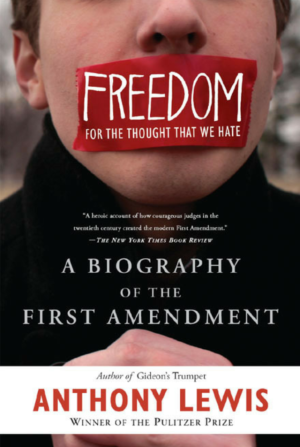
Two quick observations about First Amendment law before I get back to grading.
First, I suspect that lawyers for Sarah Palin are perfectly happy to have lost their libel suit against The New York Times, and that they would have been equally happy if they had won. What they wanted was a clean verdict — not another muddle that might have resulted in yet a third trial.
Now the case can start making its way toward a possible Supreme Court appeal, where Palin’s lawyers can argue that the “actual malice” standard of Times v. Sullivan (1964) should be overturned or substantially weakened. The standard holds that public officials must prove knowing falsehood or reckless disregard for the truth, a standard that was later extended to public figures.
As New York Times reporter David Enrich makes clear in his new book, “Murder the Truth,” Palin’s attorneys are part of a cabal of right-wing lawyers who have taken aim at the Sullivan standard — never mind that it serves to protect the conservative media just as much as it does the mainstream press.
Fortunately, the court indicated recently that there may be no more than three justices, and possibly just two, who are inclined to revisit Sullivan. Still, every time you open up a path to weakening the First Amendment, you need to hold your breath.
Second, if you haven’t read this train wreck of an interview with Holocaust scholar Deborah Lipstadt, I recommend it. Isaac Chotiner of The New Yorker spoke with Lipstadt after her recent comments that she at least partly supports Donald Trump’s attempts to deport international students who’ve expressed sympathy for the Palestinian cause, including Mahmoud Khalil of Columbia University and Rümeysa Öztürk of Tufts University.
I just want to pick up on one exchange:
Chotiner: There were some really terrible instances of antisemitism after the war in Gaza began, but now we are actually in a political environment where an American President is using antisemitism as an excuse to literally pick people up off the street for writing op-eds.
Lipstadt: Freedom of speech is freedom of speech. And I’m a stalwart supporter of freedom of speech. In other countries where they’ve outlawed Holocaust denial, I’ve spoken out against that. Freedom of speech is freedom of speech. Incitement is something else. I’m not a lawyer, and I’m not going to get into what that is.
Now, I’m not a lawyer, either, but I do teach First Amendment law to undergraduates. And the great thing about the Supreme Court is that it often writes with stunning clarity. Incitement is defined in Brandenburg v. Ohio (1969) in a way that anyone can understand it, ruling that speech was protected even in the case of a Ku Klux Klan leader who stood up in front of a crowd and demanded “revengeance” against Black people and Jews. The reason was that he was not inciting the crowd to commit violence right there and then. Here’s how the court put it:
[T]he constitutional guarantees of free speech and free press do not permit a State to forbid or proscribe advocacy of the use of force or of law violation except where such advocacy is directed to inciting or producing imminent lawless action and is likely to incite or produce such action.
Thus the court reached the end of a journey that began with Schenck v. United States (1919), in which Justice Oliver Wendell Holmes Jr. ruled that speech may not be banned unless it presented a “clear and present danger.”
Unfortunately for Charles Schenck, the court decided that his anti-draft advocacy during World War I did indeed constitute such a danger, so it was off to prison for him. But the Schenck decision was an improvement over what had come before, and it paved the way for stronger protections in the years to come, culminating with Brandenburg.
As for Lipstadt, she claims to be unqualified to comment on something that every high school graduate ought to know. Then again, she may not have realized she was violating two important rules: (1) Never agree to an interview with Isaac Chotiner unless you’re thoroughly prepared; (2) never agree to an interview with Isaac Chotiner.

